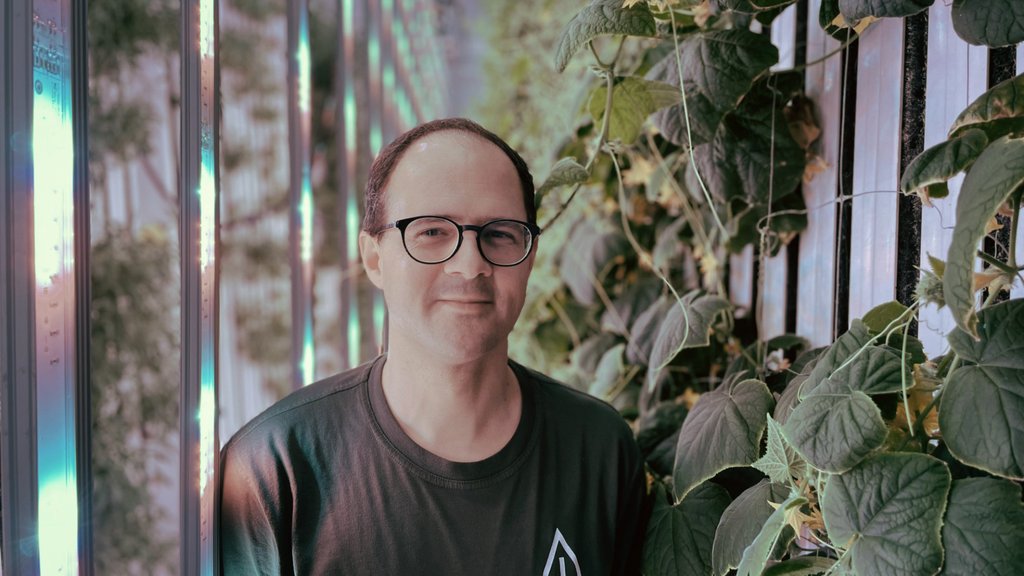Background - 26.01.2022 - 00:00
26 January 2022. “Be brave, be curious, be determined, overcome the odds. It can be done.” This quotation from Stephen Hawking hangs in the airlock to the greenhouse in the herb farm. When asked about his models, Christian Gerig names the late astrophysicist, who suffered from the neuron disease ALS. The English scientist has shaped Gerig’s view of the world – ever since he read Hawking’s A Brief History of Time as a youngster. What is it that fascinates him about Stephen Hawking? “He never lost his optimism despite his adverse situation. Accepting the conditions for what they were, he surpassed himself. I’ve always admired how creative Hawking was in a natural science such as astrophysics.”
No missionary
In the Sitter Valley, Christian Gerig and his six-strong team run Lokal365 AG, Eastern Switzerland’s first indoor farm. Not planted in beds and in soil, but fed with a little water and a nutrient solution, the herbs grow upward on the shelves. Basil, sage and mint thrive not in daylight, but in pink LED light. The contrast between the green herbs and the pink light appears futuristic. Gerig does indeed see some agricultural future in indoor farming: “In comparison with traditional agriculture, we use much less water and space and do without pesticides. Also, we can supply the region with herbs all the year round.” Electric power – and green power at that – comes from the region, too. “Clearly, it’s also a token against climate change. But missionary work isn’t my thing. I do my own thing and I’m pleased if I can inspire others by it.”
Learning from practice for practice
How did he get to plant herbs? It had appealed to him to work with a raw material that was available all year. This had already been the case in his earlier firm, with which he managed a historical bamboo forest in China and produced extracts from the leaves. With regard to vertical indoor farming, the entrepreneur appreciates the fact that he is not playing a pioneering role: “In no way did I want to do something where I was the first. There are already systems for indoor farms on which we can build.” Whether it is the distillation of herbs, which he learnt with the help of YouTube videos, or the installation of the vertical herb shelves, for which he had a team from ZipGrow, the biggest distributor of vertical agriculture, flown in from Canada: Christian Gerig is an autodidact. This was already his attitude after he completed his studies in economics at the HSG: “Now I’m learning from practice for practice.”
Sociology and self-discipline
The 44-year-old studied economics and specialised in the management of social processes. He fondly remembers the sociology lectures, particularly those by the retired professor Peter Gross. Theories such as social constructivism – i.e. how we human beings create our social reality – and the idea of a multi-option society provided him with spectacles through which he still views the world. Basically, however, he considered his studies to be rather more part of a compulsory programme. “Studying takes four to five years, and then life continues.” Besides specialist knowledge such as accountancy and sociological theories, what he primarily learnt during his university days were self-organisation and discipline.
A gap year in Afghanistan
Whereas other students brush up their English in San Diego or serve an internship in a start-up in their gap year, Christian Gerig founded his first own firm in Afghanistan after obtaining his Bachelor’s degree in 2000. And that was not just anywhere: his travels led him to Afghanistan. Together with a friend, he organised the transport of surgical instruments for amputations into the Central Asian country, which was being ravaged by war at the time. Christian Gerig received support from his uncle, a doctor who had provided humanitarian aid in Afghanistan’s war with Russia. “I wanted to do something extreme,” said Gerig, who originally hailed from the Valais. “I grew up among mountains and wanted to go to the limits of life.” On his humanitarian mission for Afghanistan, Gerig proceeded quite autodidactically: he boarded the night train to Paris, where he held out in Afghanistan’s unofficial embassy for three days and nights to wait for the Afghan foreign minister – who then actually provided Christian Gerig with a permit to enter the country and to transport the instruments to the field hospitals on the frontline. Subsequently, Gerig travelled to Afghanistan again and again for almost ten years.
Accepting conditions for what they are
One of the numerous lessons he learnt in Afghanistan is this: “You can only survive if you accept the situation and rely on your strengths. If bombs go off in the neighbourhood, you mustn’t leave the house – you haven’t got a choice.” This is the attitude he still adheres to now where it is not a matter of life and death: just start anyway. Accept conditions for what they are and look for fertile soil with the resources that are available to you.
After ten years each in Afghanistan and China, Gerig has now established a high-tech herb firm in St.Gallen. Staying here was a conscious decision: “I didn’t feel like travelling anymore.” In everything that he tackles as an entrepreneur, the following applies: “Intuition is crucial to me and my decisions because I’m often active in a completely new field.” For him, it is creativity and interdisciplinarity that are the hallmark of a genuine entrepreneur. Conversely, Gerig does not believe in government support for start-ups: “What it takes is the guts to fail. Society should see failed attempts in a positive light. Those who dare to make mistakes also help things to be discovered.”
Text: Sabrina Rohner
More articles from the same category
Discover our special topics
